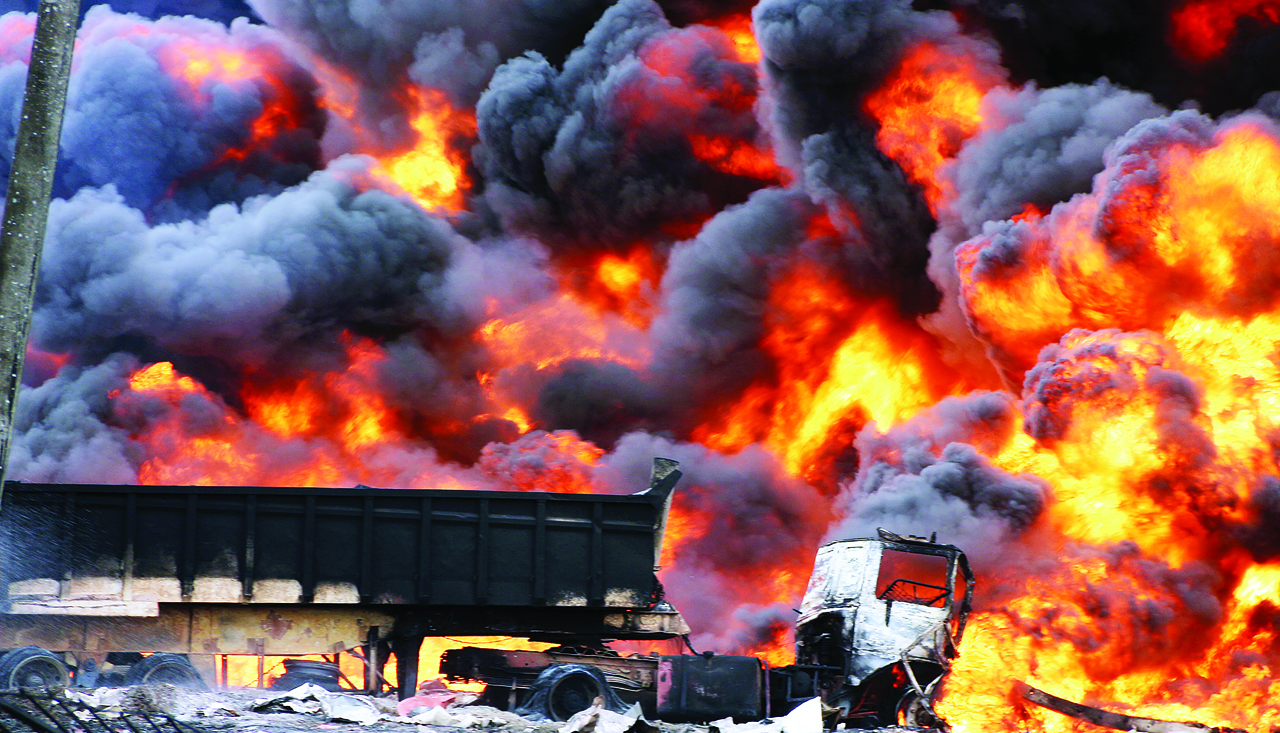
• Family of four burnt to death on way to church
• Pupils, others injured, houses, vehicles destroyed
• The blast not caused by a bomb, B’Haram, say police
• Buhari condoles with families of victims
Amid horrid reminiscences of the January 27, 2002 bomb explosion in Lagos State, which occurred on a Sunday, panic and confusion ripped through the heart of the city as news broke of a suspected pipeline explosion in the Abule Ado area of Amuwo Odofin Local Council Development Area (LCDA) yesterday.
In an instant, a loud bang shattered the serene Sunday morning. It shook the foundations of the earth as far as 15 kilometres from the scene of the incident. And in a wild melee, a thick black smoke bellowed towards the sky as fragments flew across space.
Plumes of smoke billowed into the air as people watched, while firefighters tried to quench the flames. Some buildings collapsed while many rooftops were ripped apart.
Many people were feared dead and over 50 houses were burnt. A lot of residents were trapped in the explosion, which left many people homeless and injured. The explosion happened at about 9:00 a.m. when churches in the area were holding services.
[related ids=”1126295″]
As emergency workers toiled to rescue persons trapped amid the rubble, it was confirmed that the death toll had risen to 15, as at press time yesterday evening.
According to acting Zonal Coordinator of the National Emergency Management Agency (NEMA), Mr. Ibrahim Farinloye, the bodies recovered included those of a family of four believed to be heading to church when they were caught in the explosion.
Different reasons have been given for the tragedy. The Lagos State Fire Service spokesperson, Shakiru Amodu, said the incident was an “implosion” and not an explosion. He said that efforts were ongoing to quell the fire. “It has even extended to the pipeline. We are managing the situation, but it is massive here. All agencies are working harmoniously to put out the fire,” Amodu said.
Some people claimed the explosion happened after a tipper that was offloading sand caught fire near a pipeline. The fire had reportedly spread to the pipeline, thereby triggering the explosion.
Also caught in the explosion were hundreds of Bethlehem Girls High School pupils who were trapped in their dormitories. In a viral video, many of the students could be seen jumping over the school’s fence to escape the fire and a collapsed building.
A resident of the area said some of the girls had been taken to the hospital while officials were still trying to get the others out. “It’s been difficult getting the students and teachers out,” the resident said.
Another resident who shot a video of the scene said people were still trapped in the affected buildings. “Lives have been lost, property including houses and cars have been destroyed. When we heard the explosion this morning, it was as if an aeroplane fell on our building,” he said.
Valentine Buraimoh, the chairman of Amuwo Odofin LGA, who sustained minor injuries at the scene of the incident, said about three schools were affected.
“Churches were also affected. We have been able to rescue some but more are still trapped in the buildings. We have called the Lagos State Emergency Management Agency (LASEMA) and they are on their way. But our men are still on the ground trying to rescue as many as they can,” he said.
Buraimoh, however, said pipeline vandals did not cause the explosion because soldiers stationed 30 metres away were monitoring the area. “What we know is that there is a technical fault around the pipeline, which led to the explosion,” he said.
“It is not human. The soldiers didn’t see any vandal come close to the area. And some of the eyewitnesses that were in the area before the explosion happened said they observed that there was a gas leakage before the whole place went on fire.”
The Lagos State Commissioner of Police, Henry Odumosu, also ruled out the possibility of a bomb blast. Speaking at the scene, he said there was no truth in the speculations that it was an explosive or the activity of Boko Haram, adding that only six bodies had been recovered.
The chief executive officer of LASEMA, Dr. Olufemi Oke-Osanyintolu, appealed to Lagos residents to remain calm. “We are on top of this. When we come up with the details of the investigation, we will tell you the casualty figure,” he said.
The Nigerian National Petroleum Corporation (NNPC) said the explosion occurred after a truck hit some gas cylinders stacked in a gas processing plant located near the corporation’s System 2B Pipeline Right of Way.
In a statement by NNPC Group General Manager, Group Public Affairs Division, Dr. Kennie Obateru, the corporation explained that preliminary findings indicated that the impact of the explosion was so huge that it led to the collapse of nearby houses and damaged an NNPC’s pipeline.
The Group Managing Director of NNPC, Mallam Mele Kyari, and other top management staff of the corporation departed for Lagos yesterday evening for an on-the-spot assessment of the scene.
Obateru said following the report of the explosion, the corporation quickly halted ongoing pumping operations on the Atlas Cove-Mosimi pipeline, which was active at the time.
On January 18, 2020, a pipeline exploded around the Ekoro area in Abule-Egba, Lagos. At least, three persons lost their lives. Many houses and vehicles were also damaged. That incident occurred after some vandals allegedly ruptured a pipeline in a bid to scoop fuel.
President Muhammadu Buhari, meanwhile, has commiserated with those who lost loved ones in yesterday’s incident
In a statement by his Senior Special Assistant on Media and Publicity, Garba Shehu, he also condoled with the Lagos State government and all residents affected by the incident.
Buhari said: “I have received with sadness the news of this unfortunate incident which caused the loss of lives and property. A misfortune of whatever scale anywhere is a tragedy to the country, and while the NNPC makes efforts to determine the cause of the incident, I send my deepest and profound sympathy to the victims, their families, government and people of Lagos State.”
Also, the Human Rights Writers Association of Nigeria (HURIWA) yesterday described as inefficient and ineffective the workings of the National Emergency Management Agency (NEMA) and other Lagos State government’s funded first responders over their failure to respond to the distress calls of the school children trapped in the suspected pipeline explosion.
It called on the state government to set up a judicial probe panel on the disaster and many others and find lasting solutions.
HURIWA, in a statement signed by the national coordinator, Emmanuel Onwubiko, in Abuja, said institutions such as the Lagos State Fire Service, NEMA and LASEMA are in need of a comprehensive overhaul, to bring them in speed with the 21st-century demands of urgency, efficiency and effectiveness in the event of natural or man-made disasters.
The rights group said it was shocked that these kinds of disasters keep repeating themselves intermittently with attendant high tolls of casualties and that the state administration has not bothered to put in place effective strategies to curb the occurrences
“From available documentary evidence it is clear that but for the swift efforts of ordinary Nigerians made up of mostly young boys who rescued most of the students of the Bethlehem Catholic Boarding School, the number of casualties would have been multiplied.
“There are clear enough evidence to show that for many hours the fires raged and the victims were left to their own device, if not for the humanitarianism of those brave Lagos youths who actively coordinated effective rescue operations through unorthodox means with no facilities,” it said.
HURIWA, therefore, called on the Federal Government to do something radical and fundamental to salvage NEMA from its current standards, while blaming the state government for allowing the development of factories and residential buildings such as boarding schools to be located within short distances from such explosive facilities like the NNPC pipelines.
“The Lagos State administration should be blamed squarely for letting such accidents to be choreographed and orchestrated through the state government’s lack of urban development planning strategies and due to corruption by the housing development departments of the state government.”






